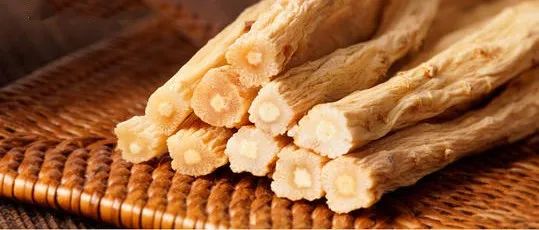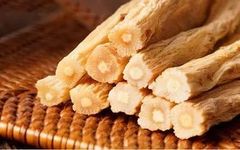Starting today, the Chinese herbal medicine cultural team will organize thousands of Chinese herbs and categorize them for everyone. Please look forward to daily sharing of one herb, presented with rich images and videos for your learning and enjoyment. If you have any questions, feel free to leave a comment at the bottom of the article; we have enabled the comment feature for better communication.
CCTV Science Education: How to Use Codonopsis Correctly?

(Li Qian Deputy Chief Physician, Department of Nephrology, Guang’anmen Hospital, China Academy of Chinese Medical Sciences)
Tonifying Qi, Strengthening the Spleen and Lungs, Nourishing Blood and Generating Fluids
Codonopsis (Dang Shen) is a Qi-tonifying herb, characterized by its neutral nature and sweet flavor. It has the effect of tonifying Qi, which can alleviate symptoms such as poor appetite, fatigue, and diarrhea caused by insufficient middle Qi. Regular consumption of Codonopsis tea can also enhance the body’s immunity and prevent disease.
Codonopsis enters the Spleen and Lung meridians, and it also strengthens the Spleen and Lungs, improving their functions. It can treat symptoms such as pale complexion, cold extremities, shortness of breath, and cough due to Spleen and Lung deficiency.
Additionally, Codonopsis has the effect of nourishing blood and generating fluids, enhancing the body’s hematopoietic function and increasing hemoglobin levels, making it suitable for patients with anemia. If symptoms such as palpitations, chest tightness, dry throat, and thirst arise from blood deficiency and fluid depletion, Codonopsis can also help alleviate these conditions.
Suitable Groups
Individuals with Qi and blood deficiency, Spleen and Lung Qi deficiency, and those with fluid depletion and thirst.
Contraindicated Groups
Those with excess pathogenic factors or heat accumulation.
Foods to Avoid
Li Lu (Veratrum)
Codonopsis is a nourishing herb that requires internal consumption to take effect, while Li Lu is an emetic herb that can cause nausea and vomiting. Taking them together may lead to the expulsion of Codonopsis before it can exert its medicinal effects. Furthermore, Li Lu is toxic, and combining it with Codonopsis may cause adverse reactions.
Consumption Method
Boiling
First, soak Codonopsis in clean water for about an hour, then add it to a pot with water for decoction. After boiling, drink it warm. You can also add red dates (Hong Zao) and goji berries (Gou Qi) according to your condition and follow medical advice.
Suitable Groups and Contraindications for CodonopsisConfused between Ginseng and Codonopsis? Discover the effects of Codonopsis!
The order of sharing Chinese herbs is as follows. We have previously organized the effects and uses of Chinese herbs, and you can click the image below to enter the Chinese herb query system and search by letter. Now we are reorganizing from another perspective, categorizing them again in more detail for easier future reference.
Tonifying Herbs
1. Qi Tonifying Herbs
1. Ginseng; 2. American Ginseng; 3. Codonopsis; 4. Prince Ginseng; 5. Astragalus; 6. Atractylodes; 7. Chinese Yam; 8. Hyacinth Bean; 9. Licorice; 10. Jujube; 11. Siberian Ginseng; 12. Rhodiola; 13. Honey;
2. Yang Tonifying Herbs
14. Deer Antler; 15. Human Placenta; 16. Epimedium; 17. Morinda Root; 18. Xian Mao; 19. Eucommia; 20. Dipsacus; 21. Cistanche; 22. Cynomorium; 23. Psoralea; 24. Alpinia; 25. Cuscuta; 26. Astragalus; 27. Chives; 28. Walnut; 29. Cordyceps; 30. Fenugreek; 31. Gecko; 32. Yangqi Stone; 33. Purple Quartz; 34. Sea Horse.
3. Blood Tonifying Herbs
35. Angelica; 36. Rehmannia; 37. White Peony; 38. Donkey-hide Gelatin; 39. He Shou Wu; 40. Longan; 41. Chebula;
4. Yin Tonifying Herbs
42. North American Ginseng; 43. South American Ginseng; 44. Lily; 45. Ophiopogon; 46. Asparagus; 47. Dendrobium; 48. Polygonatum; 49. Rhizoma Polygonati; 50. Goji Berries; 51. Eclipta; 52. Black Sesame; 53. Turtle Shell; 54. Soft-shelled Turtle Shell.
☯ The above content is for reference only and is reviewed by the Chinese herbal medicine cultural team.

Free Chinese Herb Query Click the image
Click the image


Recommended Valuable Public Accounts

Follow early, then save!
The more people see, the more health benefits!

For example: Benzoin, Mugwort, Ferula, Donkey-hide Gelatin, Brasenia, Hyacinth Bean, Psoralea, Mint, Plantago, Turtle Shell, Borneol, Bean, Bletilla, Fritillaria, Alisma, White Peony, White Atractylodes, Cicada Slough, Andrographis, Siberian Ginseng, Angelica, Prince Ginseng, Codonopsis, Eucommia, Dandelion, Winter Melon Seeds, Dongfeng Orange, Fermented Soybeans, Winter Melon Skin, and many more… Thousands of Chinese herbs…. More
☛ If you have any questions, please leave a comment, and we will organize and publish them one by one!
✍ Every time you click “Share” is a support forChinese Herbal Culture~ Thank you! ❤

